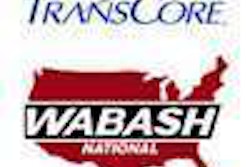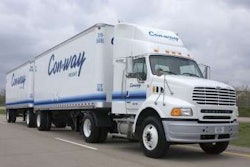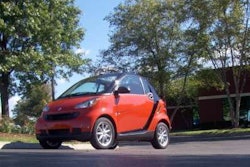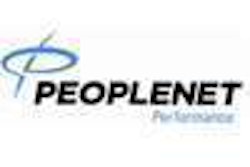Smith Electric Vehicles U.S. Corp. on Friday, March 27, announced its plan to assemble its all-electric zero-emissions commercial vehicles in Kansas City, Mo. The company says the new assembly plant will be located at a portion of an airline overhaul base at Kansas City International (KCI) Airport and is expected to create 120 jobs by 2010.
Production of the first zero-emissions commercial trucks is scheduled to begin in the third quarter. SEV U.S. Corp., a Delaware corporation headquartered in Kansas City, says it initially will focus its production on battery-electric-powered vehicles for depot-based predictable-route delivery fleets.
“We feel the greatest opportunity to have a major impact on the electric vehicle industry is through fleet operators who utilize commercial vehicles in a depot-based delivery model,” says Bryan Hansel, chief executive officer of SEV U.S. Corp. “As more truck fleets adopt this technology, it will drive advancements in battery technology, drive down manufacturing costs and form the foundation of a U.S.-based supply chain that, over time, will also significantly reduce the cost of commercial electric vehicles. This will make them a natural choice for fleet managers with a depot-based delivery model.”
SEV U.S. Corp. says the decision to locate the plant in Kansas City represents an initial investment of $10 million in the metro area. The KCI overhaul base was selected for the new assembly plant because of its open configuration and immediate availability. The assembly plant will occupy 80,000 square feet at the overhaul base at startup and will scale up based on demand. SEV U.S. Corp. also is leasing 8,600 square feet of office space at the Ambassador Building at KCI. The company will receive close to $3 million in job training funds and other incentives from the state of Missouri and Kansas City.
SEV U.S. Corp. says the Kansas City Area Development Council facilitated the site selection process and notes that the decision emphasizes the Kansas City region as a player in the evolving world of advanced energy and transportation. SEV U.S. Corp. says it already has received a strong expression of interest from fleet operators, and as a result, the company is building a highly scalable assembly operation and supply chain to serve this emerging market. SEV U.S. Corp. will begin production using chassis from multiple vehicle manufacturers.
Canteen Vending Services, a national vending company and an operating division of the Compass Group North America based in Charlotte N.C., halready as signed a letter of intent with SEV U.S. Corp. to purchase some of the first zero-emissions vehicles to roll off the assembly line. “Canteen has been proactively seeking, testing and evaluating vehicles with the latest in fuel efficiency and clean technology for adoption into our fleet specs,” says Tim Goff, Compass Group’s senior vice president of strategic initiatives. “Smith Electric Vehicles is the first to provide a zero-emissions vehicle that fits our route delivery model. As a key U.S. launch customer, Canteen is delighted to support SEV U.S. Corp. and to lead the vending industry in reducing carbon output.”
Frito-Lay North America, a division of PepsiCo that is headquartered in Plano, Texas, and Pacific Gas and Electric Co., headquartered in San Francisco, also have signed on as launch partners. Through its U.K. partner, The Tanfield Group Plc, SEV U.S. Corp. is working with Ford Motor Co. to electrify the Ford Transit Connect as a BEV (battery electric vehicle) light-duty van scheduled for production in 2010.
“We are pleased to be collaborating with SEV U.S. Corp. on the first of the battery-electric vehicles we will bring to market over the next several years,” says Derrick Kuzak, Ford’s group vice president of global product development. “With the delivery of the battery-electric Transit Connect, together we will be delivering a product that will satisfy the needs of fleet customers interested in moving toward electric mobility solutions.”
SEV U.S. Corp. is a privately held company and is owned by U.S. investors and The Tanfield Group Plc, based in the United Kingdom. Tanfield is also the parent company of Smith Electric Vehicles, a manufacturer of zero-emissions battery-electric commercial vehicles in Europe since the 1920s. Smith has produced the Newton truck in Europe for more than three years and has sold vehicles to major fleet operators in sectors such as mail and parcel delivery, logistics, retail, highway maintenance and airports.
“Smith Electric Vehicles’ zero-emission vans and trucks are proven products that have a long history of reliability in Europe,” Hansel says. “We are bringing Smith’s proprietary know-how to the U.S. to integrate electric powertrains, lithium-ion battery packs and control systems into commercial truck chassis envelopes that meet the specific requirements of the North American fleet market.”
SEV U.S. Corp.’s first zero-emissions truck model will be the Smith Newton, the world’s largest battery-electric-powered truck. It has a top speed of up to 50 mph, a range on one battery charge in excess of 100 miles and a payload of up to 16,280 pounds. SEV U.S. Corp. will utilize the Enova P120 drive system for the Newton, a solution currently being used by Smith in Europe. SEV U.S. Corp. says the selection of Torrance, Calif.-based Enova Systems Inc.’s P120 drive system aligns with its core strategy to build a strong U.S.-based supply chain.
In addition to its partnership agreement with Ford on the Transit Connect, SEV U.S. Corp. says it will expand its zero-emissions product line to include other van and light truck models based on demand.












